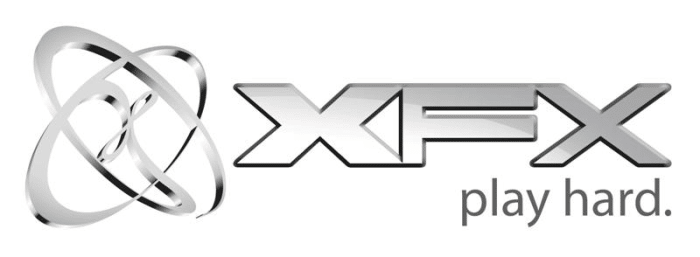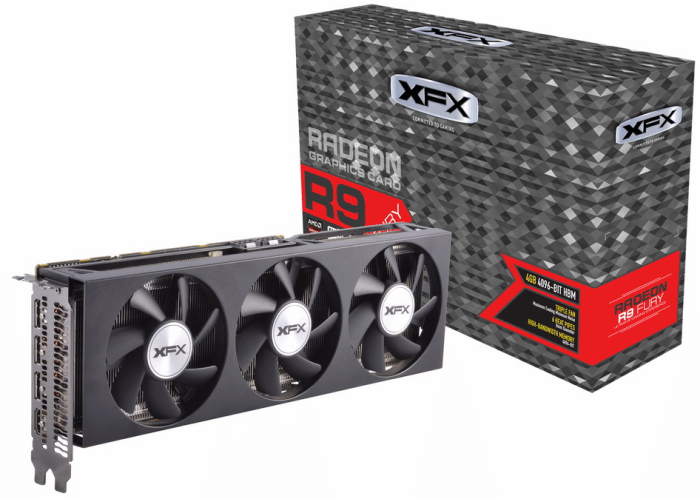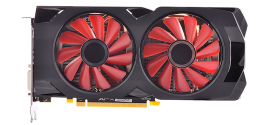XFX R9 Fury Pro Triple Dissipation
“XFX dares to go where the competition would like to, but can’t. That’s because, at XFX, we don’t just create great digital video components—we build all-out, mind-blowing, performance-crushing, competition-obliterating video cards, power supplies, and computer accessories. And, not only are they amazing, you don’t have to live on dry noodles and peanut butter to afford them.
XFX is a division of PINE Technology Holdings Limited, a leading manufacturer and marketer of innovative solutions for the worldwide gaming technologies market. Founded in 1989, PINE designs, develops, manufactures and distributes high-performance video graphics technology and computer peripherals. The company’s dedicated research and development team are continually pushing the limits to meet the demands of the ever-growing and performance-driven community. Headquartered in the Hong Kong Special Administrative Region (Hong Kong SAR), PINE has more than 1,000 employees worldwide with 16 offices around the globe. PINE also maintains four state-of-the-art research and development facilities in the Asia Pacific region and two factories in Mainland China.”
Leave it to XFX to take the R9 Fury and put the XFX twist on it and produce a massive Triple Dissipation cooling solution that gives the card the classic XFX look and pushes it to market with style. The XFX R9 Fury Pro Triple Dissipation features a Fiji core variant called Fiji Pro using a 28nm process packing 8.9 Billion transistors onto a large 596 mm² Die. The stylish XFX R9 Fury Pro Triple Dissipation was released quietly on September 21st 2015 with a PCIe 3.0 x16 connector and is fully DirectX 12 capable, OpenGL 4.5, OpenCL 2.0 and Shader Model 5.0.
The Fiji Pro core on the XFX R9 Fury Pro Triple Dissipation is clocked at 1000MHz with a memory clock of 500 MHz (1000 MHz Effective) and has an amazing 3584 Shader Units, 224 TMUs, 64 Rops, 56 Compute Units capable of a Pixel rate of 64.0 GPixels, 224 G Texel/s and a floating point performance of 7.168 GFLOPS.
AMD birthed the introduction of HBM (High Bandwidth Memory) on video cards on the R9 Fury and equipped it with an almost generous 4GB of HBM running across a 4096 bit which up until HBM was unheard of and far beyond the capacity of conventional un-stacked memory. We say almost generous amount of memory but we are entirely sure that equipping it with 6 GB of HBM would have driven the card beyond proper placement in the price / performance scale. The memory bandwidth on this fledgling technology is 512 GB/s which is noticeably higher than the bandwidth seen on the GTX 980 Ti which has 384 GB/s. While the fledgling technology of HBM is probably the next step in memory technology for video cards, when launched, it wasn’t the game changing punch many people expected but it is a first for technological achievement in video card technology and AMD is ahead in the HBM integration field. Unfortunately HBM yields on the production of HBM by Hynix weren’t high enough for AMD to be able to field the technology on the R9 300 class video cards across the board so AMD used it on its Flagship Fury line.
Video Card Comparison Chart
| Radeon R9 390X |
GeForce GTX 980 |
Radeon R9 Fury |
XFX R9 Fury Pro TD |
Radeon Fury X |
GeForce GTX 980 Ti |
|
|---|---|---|---|---|---|---|
| Shader Units | 2816 | 2048 | 3584 | 3584 | 4096 | 2816 |
| ROPs | 64 | 64 | 64 | 64 | 64 | 96 |
| Graphics Processor | Hawaii | GM204 | Fiji | Fiji | Fiji | GM200 |
| Transistors | 6200M | 5200M | 8900M | 8900M | 8900M | 8000M |
| Memory Size | 8192 MB | 4096 MB | 4096 MB | 4096 MB | 4096 MB | 6144 MB |
| Memory Bus Width | 512 bit | 256 bit | 4096 bit | 4096 bit | 4096 bit | 384 bit |
| Core Clock | 1050 MHz | 1126 MHz+ | 1000 MHz | 1000 MHz | 1050 MHz | 1000 MHz+ |
| Memory Clock | 1500 MHz | 1750 MHz | 500 MHz | 500 MHz | 500 MHz | 1750 MHz |
| Price | $430 | $480 | $549 | $550 | $650 | $650 |
 Bjorn3D.com Bjorn3d.com – Satisfying Your Daily Tech Cravings Since 1996
Bjorn3D.com Bjorn3d.com – Satisfying Your Daily Tech Cravings Since 1996











You’ve made an error and put the BF4 4K table in where the Far Cry 4 4K table should be. You’ve even written you paragraph below based on the wrong results!
Try proof reading.
Correction Made Thanks
After I originally commented I seem to have clicked the
-Notify me when new comments are added- checkbox and from now on whenever a comment is
added I get four emails with the same comment.
Is there an easy method you are able to remove me from that service?
Thanks a lot!
Hi Mark. I would like to see this result again with the XFX Fury card but this time in Ultra Wide monitor. Like 3440×1440 to as high as 3800×1600 21:9 to put that bandwidth to the tests. I strongly suggesting 1000’s series added to the test with the former 900’s Nvdia card just for fairs comparison as the driver relive update make the older same architect chip perform better. It only a outdated model but would it be fair those who brought the HD 7000’s, R9 200x Hawaii, R9 300x Refresh, and the Fury Nano card hold today in future investment and the 290x being the best investment card of the series in my opinion. With or without the Nvdia 1000’s or AMD 400’s is up to you.